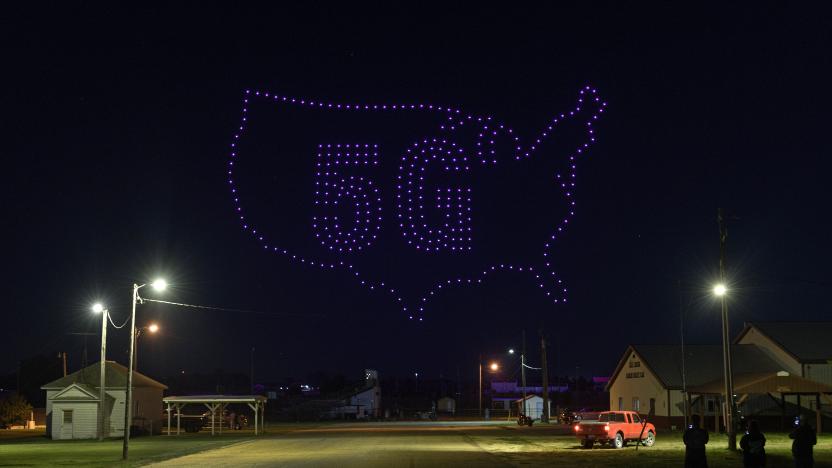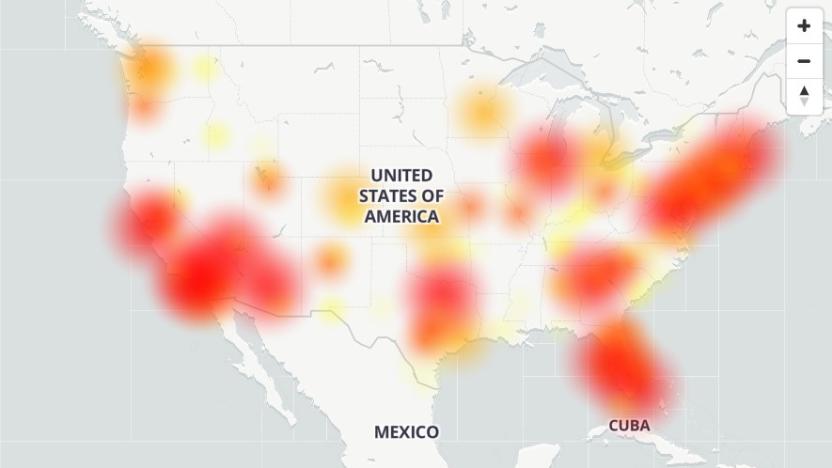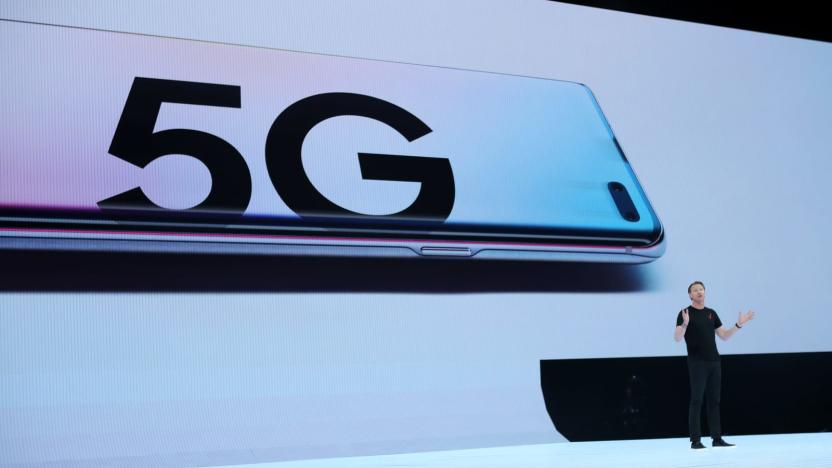mobile network
Latest

T-Mobile switches on its standalone 5G network in thousands of cities
Unlike other 5G networks in the US, it's not built on top of LTE infrastructure.

T-Mobile outage finally ends after more than twelve hours (updated)
Reports suggest people are unable to make or receive calls.

Verizon’s 5G network is available in (parts of) Dallas and Omaha
Verizon (Engadget's parent company) has expanded its 5G Ultra Wideband coverage to Dallas and Omaha, Nebraska. The service is now available in 15 cities, including Denver, Atlanta, DC, Detroit, Indianapolis and New York.

Verizon plans to roll out its 5G mobile network in 30 cities this year
At Samsung's Unpacked event Wednesday, it emerged Verizon is getting a short-term exclusive on Samsung's first 5G phone, the Galaxy S10 5G. To make sure people can use the handset and other 5G phones as intended, the provider plans to turn on its 5G mobile network in 30 US cities this year.

Carphone Warehouse launching flexible 'iD' mobile network next month
Does the UK need another carrier? Carphone Warehouse seems to think so. It's been rumoured for months, but finally the company is ready to unveil its own mobile network. "iD" will arrive in May and, as expected, be powered by Three's network infrastructure. What makes it special? Well, the retailer says it's focusing on a few key benefits. The first is "controlled and capped plans," which it claims will be the cheapest on the market. It's also emphasising "flexible" 12-month contracts and 30-day SIM-only plans.

Three UK's owner is buying O2
A huge mobile shake-up has just kicked off in Britain. Telefonica has agreed to sell O2 to Hutchison Whampoa, the owner of Three UK, for £10.25 billion. We knew it was likely, after the pair entered "exclusive negotiations" back in January, but now it's essentially a done deal. Provided the purchase is approved by regulators, it means the UK's four major networks will soon become three: Vodafone, EE and the combined might of Three and O2. The confirmation comes by way of Telefonica, although the company is saying little beyond the amount of money involved. For instance, it's unclear if Hutchison Whampoa plans to maintain O2's brand and services in the UK, or merge them entirely with Three.

UK government and industry heavyweights set up 5G Innovation Centre, want to go one better
The UK is almost ready to flip the switch on its first LTE network, but it's determined to be at the forefront of the next-generation, setting up a "5G Innovation Centre" at the University of Surrey. The government announced it's putting up £11.6 million (around $18.6 million) in funding, but another £24 million (around $38.5 million) will be coming from an industry group comprising the likes of Huawei, Samsung, Telefonica, Rohde & Schwarz, Fujitsu and others. The money will allow research to go beyond concept and theory, with the aim that all partners work together to develop and standardize 5G technology, which the university has been looking into for a number of years already. They will focus on energy and spectrum efficiency as well as speed, and although it's early days, 10Gbps has been banded around as a per-tower target, translating to roughly 200Mbps for each connection. Unfortunately, we've also got a number to kill your geek buzz -- it's upwards of a decade away. Still, at least you've got a long time to think about which case you'll be picking up for your 5G-ready Galaxy S XV.

Mach inks carrier billing deal with Everything Everywhere, O2, Vodafone and Three in the UK
Not a month after Mach's last carrier billing deal, UK network providers Vodafone, Three, O2 and Everything Everywhere are getting in on the action. The company's direct billing solutions will initially allow the networks to charge app and online purchases straight to your bill, with in-app sales joining them at a later date. Don't expect this to be implemented immediately, however, as the agreement covers the back-end processing -- the individual carriers will be responsible for turning it on customer-side. They'll likely inform you when they hit the switch and your phone bill becomes a monthly surprise.

Rogers boosting its LTE coverage in Canada, will cover 10 new cities by October 1st
We're sure it's just coincidence, but on the same day a certain new LTE phone was revealed, Rogers announced the expansion of its 4G network in Canada. By October 1st, the carrier will have switched on its high-speed network in Kingston, Edmonton, Quebec City, Oakville, Burlington, London, Kitchener, Waterloo, Cambridge and Barrie. That's not quite the end of it either, as the plan is to feed 60 percent of the country's inhabitants the same 4G nourishment by the end of the year, and even more in 2013. With so many new LTE-capable devices soon finding their way into the hands of data-hungry Canadians, all that remains is the important decision of choosing your latest pocket-filler.

Sprint confirms its HD Voice is incompatible with the iPhone 5
The new, lighter iPhone 5 has a bigger screen, punchier processor, LTE and dual-band WiFi, but if you plan to pick one up for Sprint's network, you can't have it all. Carrier spokesperson Michelle Leff Mermelstein told Phone Scoop that its version of HD Voice will not work on Apple's new wünderphone. While most carriers use WCDMA networks to achieve the greater definition, Sprint uses CDMA 1X Advanced, which unfortunately isn't compatible with the handset. Knowing the feature will be missing prior to launch isn't ideal, but when you're calling your friends to boast about that day-one purchase, a slight drop in clarity isn't likely to kill your geek buzz.

Skype strikes deal with Mach to expand direct carrier billing for credit purchases
Skype is always finding new ways of making it easier for users to spend money, and now it's extending its carrier billing options in a new deal with Mach. From October, more users than ever will be able to buy credit for the VoIP service then forget about it -- at least until the phone bill arrives. Purchases will initially be available through a web browser, but in-app functionality is expected in the future, although there's no word on exactly which network providers will be involved. We hope, however, that sometime next month, at least a few of those who enjoy Skyping on the move will appreciate sending the bill to their carrier.

Data-hungry crowds spoil Olympic TV coverage, archers alerted
With an opening ceremony celebrating social media and a guest appearance by the father of the world wide web, you would think the games are pretty Twitter-friendly. Well, not so much, as the hordes of London have been told to keep non-urgent texts and tweets to themselves to avoid disrupting TV coverage for those who weren't lucky enough to score beach volleyball tickets. The recommendation comes after broadcasters bumbled through the men's cycling road race due to a lack of available data from the cyclists' GPS. The information bottleneck appears to be related to one specific network and sharing the data burden has been discussed, although probably not via Twitter. The IOC knows that telling the masses not to log on likely won't have any impact -- so, what's next for the data haters.

Shocker! Three's unlimited data adopters use lots of 3G
Three, a UK mobile network provider specializing in unlimited data packages, has reported that its customers are talking full advantage of their plans. Specifically, the average monthly usage has more than doubled this summer (we use the term loosely) from 450MB to 1.1GB over the same period last year. Smartphone users are understandably the healthiest eaters, sucking down around 1.5GB per month. With the BBC continuing to expand its 3G offerings and an undoubted increase in tablet use, tethering and the like, we imagine these figures are far from their peak. With 4G on the horizon, will Three regret positioning itself as the great provider; or, like Sprint over in the US, will it stand its ground for the sake of an advantage?

Google badmouths HTTP behind its back, proposes SPDY as a speedy successor
If there's anything that Google doesn't like, it's things that collect dust. The company is famous for its annual spring cleaning efforts, in which the firm rids itself of redundant and dead-end projects, along with more bullish moves, such as its push to overhaul the internet's DNS system. Now it's looking to replace HTTP with a new protocol known as SPDY, and to that end, it's demonstrating the potential speed gains that one might expect on a mobile network. According to the company's benchmarks, mean page load times on the Galaxy Nexus are 23 percent faster with the new system, and it hypothesizes that further optimizations can be made for 3G and 4G networks. To its credit, Google has already implemented SPDY in Chrome, and the same is true for Firefox and Amazon Silk. Even Microsoft appears to be on-board. As a means to transition, the company proposes an Apache 2.2 module known as mod_spdy, which allows web servers to take advantage of features such as stream multiplexing and header compression. As for HTTP, it's no doubt been a reliable companion, but it seems that it'll need to work a bit harder to earn its keep. Stay weird, Google, the internet wouldn't be the same without you.

Nokia Siemens HSPA+ Multiflow lets one device connect to two cell sites simultaneously
If you've ever used a cell phone while moving, then you've probably experienced the depressed network connectivity that becomes more of an issue as you move further away from any given tower. Some of us are even unfortunate enough to reside or work right at the edge of a cell, forced to live with poor connectivity for much of every day. A new feature called HSPA+ Multiflow may offer some relief, "delivering double the data speed and up to 50 percent faster response compared to existing HSPA+ networks," according to Nokia Siemens, which will be demonstrating the technology at Mobile World Congress later this month. Essentially, Multiflow allows compatible devices on the edge of a cell to connect to two sites simultaneously, letting your device send and receive data between two base stations at once. Multiflow will be available as a software update for Single RAN systems, so it could make its way to a cell site near you just after Nokia Siemens flips the switch during the second half of 2013. Full PR is just past the break.

AT&T seeks to impose conditions on Dish LTE network, FCC to settle wireless squabble
You know the saying, second place is the first loser? Well, it looks like AT&T, which recently saw its attempt to absorb T-Mobile thwarted, is living up to that adage by petitioning the FCC to impose an "overly aggressive buildout" of Dish's planned mobile network. In a recent filing to the Commission, the satco countered this request for "LightSquared-like" requirements, defining its operation as a strictly retail endeavor, one that faces entirely different hurdles than that of its wholesale competitor. If granted, however, these conditions could see the fledgling network rushed to the marketplace before the completion of an LTE-Advanced standard and widespread availability of compatible devices -- both key elements of the MVPD's service strategy. The company also goes on to contest interference issues surrounding its 700MHz holdings, stating that it has no current plans to repurpose the spectrum for mobile broadband use, despite AT&T's claims to that effect. We'll keep you posted as this wireless battle plays out. In the meantime, hit up the source below to peruse the dense legalese.

Everything Everywhere's £1.5 billion investment to bring 4G to Orange and T-Mobile in the UK
So far there have been some limited LTE trials, but the truth remains: UK 4G isn't happening any time soon. A fact not lost on Everything Everywhere CEO Olaf Swantee, who's raiding the coffers to a tune of £1.5 billion to bring the Orange and T-Mo UK up to speed. Top of the shopping list, naturally, is the network equipment needed, in time for when the spectrum eventually gets auctioned off -- currently expected to be late 2012. The cash injection is part of a three-year investment, so don't expect that minty fresh network any time soon, but UK users can at least take refuge in knowing that Swantee, and his brace of providers, are pushing to bring old Blighty decent data rates sooner rather than later. That's if they've been given back in time.

AT&T SVP: LTE 'coming soon' to NYC
How do you like them acronyms? If you had any doubt that AT&T would bring LTE to NYC in the near future, it's time to put that doubt aside -- sort of. Speaking at the Mashable Media Summit Friday, Senior VP of corporate communications Larry Solomon said that New York City would be sheathed in Ma Bell-branded high speed "soon." Sure it's vague, but it's something. Here's what he had to say: We're investing about $20 billion this year in our network, adding cell sites in New York City alone, rolling out 4G LTE. We'll have about 70 million consumers covered across the US by the end of this year, and it's going to be coming to New York City soon. There's no telling when the big city will get it's taste of the AT&T LTE pie, but it will be in good company when it does. The carrier announced just this week that it would add Boston, Washington DC, Baltimore and Athens, GA to its 4G lineup. Video of Mr. Solomon's speech awaits you after the break.

US leads global LTE adoption, rides Verizon's coattails
There's no doubt the demand for mobile broadband has skyrocketed worldwide, but the US is leading the LTE charge(s) -- plural, 'cause you know, battery life sucks on a... nevermind. According to Pyramid Research, by the end of the year, the United States will claim 47 percent of LTE subscriptions globally. This is thanks in large part to three mobile operators: Verizon, MetroPCS and AT&T have created seven million connections across the country. Combine that with the fact that 71 percent of all LTE handsets will be in the pockets of Yanks by year's end, and you've got a formula for domestic LTE domination. It comes as no surprise that VZW is the largest LTE operator in the US as it's been making money hand over fist lately -- which has allowed it to expand its high speed network at a dizzying pace. We salute you, Big Red, for carrying the banner for the ol' US of A, blazing the trail littered with dead batteries and over-worked phone chargers.

Australia's first mobile network celebrates 30th birthday with a quiet night in
Why is this phone staring at the ground in dismay? Because it can't believe that it's been 30 years since it made history. On this day three decades ago, this 14 kilogram beast was used to place the very first call on Australia's very first mobile network -- the Public Automatic Telephone System, operated by Telstra (or Telecom, as it was known at the time). Back then, the network could only support 1,000 users at once and provide coverage for the greater Melbourne area (things have since changed for the better). The device, meanwhile, was known simply as The Mobile Phone and, in retrospect, wasn't all that mobile; the carphone system included a 45 centimeter handset, a transceiver and rooftop antenna -- all for a little over $5,000. It could also store a whopping 16 phone numbers and would notify users of incoming calls by sounding the car's horn and flashing its headlights. The Mobile Phone's Australian reign, however, would be relatively short-lived, with the DynaTAC 8000x ushering in a new handheld era, just two years after Telstra's inaugural call. Dial past the break for a Wagnerian commercial that'll tell you everything you always wanted to know about antiquity, but were too afraid to ask. [Thanks, Vincent]










